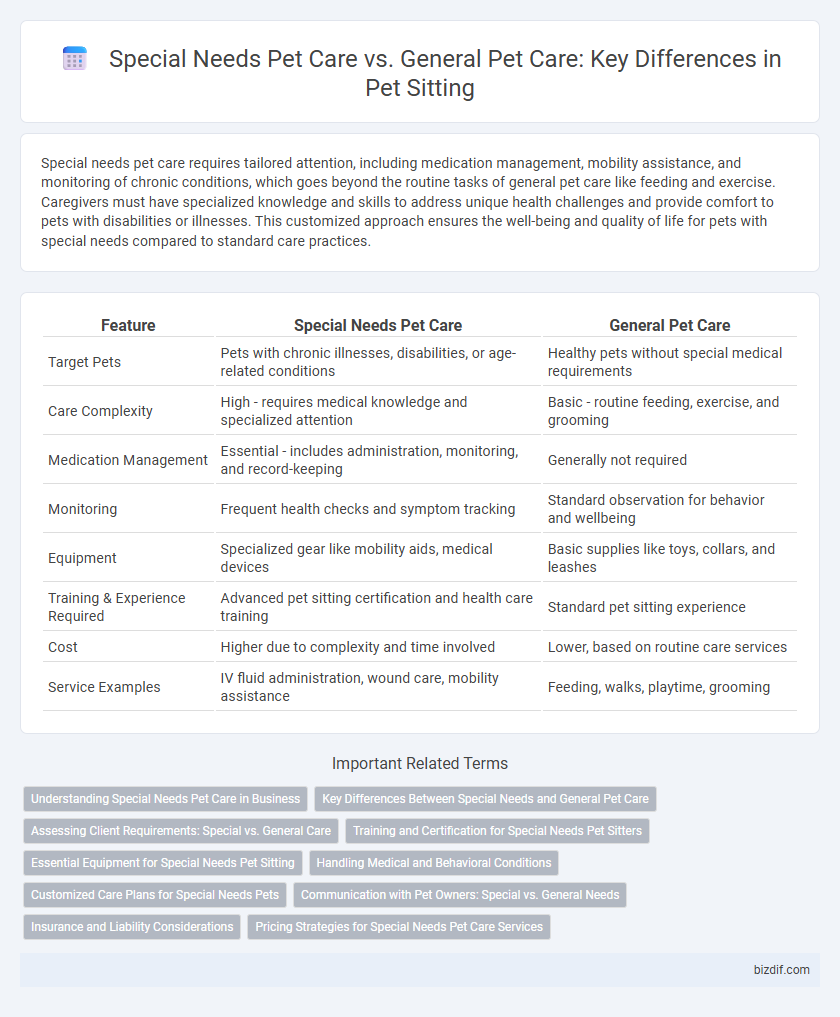Special needs pet care requires tailored attention, including medication management, mobility assistance, and monitoring of chronic conditions, which goes beyond the routine tasks of general pet care like feeding and exercise. Caregivers must have specialized knowledge and skills to address unique health challenges and provide comfort to pets with disabilities or illnesses. This customized approach ensures the well-being and quality of life for pets with special needs compared to standard care practices.
Table of Comparison
| Feature | Special Needs Pet Care | General Pet Care |
|---|---|---|
| Target Pets | Pets with chronic illnesses, disabilities, or age-related conditions | Healthy pets without special medical requirements |
| Care Complexity | High - requires medical knowledge and specialized attention | Basic - routine feeding, exercise, and grooming |
| Medication Management | Essential - includes administration, monitoring, and record-keeping | Generally not required |
| Monitoring | Frequent health checks and symptom tracking | Standard observation for behavior and wellbeing |
| Equipment | Specialized gear like mobility aids, medical devices | Basic supplies like toys, collars, and leashes |
| Training & Experience Required | Advanced pet sitting certification and health care training | Standard pet sitting experience |
| Cost | Higher due to complexity and time involved | Lower, based on routine care services |
| Service Examples | IV fluid administration, wound care, mobility assistance | Feeding, walks, playtime, grooming |
Understanding Special Needs Pet Care in Business
Special needs pet care requires specialized knowledge of medical conditions, dietary restrictions, and behavioral differences to ensure proper attention and safety. Businesses offering this service must invest in training staff to manage medications, mobility aids, and emergency protocols tailored to pets with disabilities or chronic illnesses. Providing individualized care plans distinguishes special needs pet sitting from general pet care, enhancing trust and client satisfaction.
Key Differences Between Special Needs and General Pet Care
Special needs pet care requires specialized knowledge of medical conditions, tailored medication administration, and customized diet plans, unlike general pet care which primarily focuses on standard feeding, exercise, and grooming routines. Special needs pets demand close monitoring for symptoms and immediate intervention during emergencies, whereas general pet care involves routine health checks and preventative measures. The key differences lie in the intensity of care, specialized training, and constant vigilance necessary to ensure the wellbeing of pets with chronic illnesses, disabilities, or recovery needs.
Assessing Client Requirements: Special vs. General Care
Assessing client requirements for pet sitting involves distinguishing between special needs pet care and general pet care to provide tailored support. Special needs pets may require medication administration, mobility assistance, or dietary restrictions, requiring detailed communication and customized care plans. General pet care typically includes feeding, exercise, and companionship, focusing on routine maintenance without complex interventions.
Training and Certification for Special Needs Pet Sitters
Special needs pet care requires specialized training and certification beyond general pet care to address conditions such as chronic illnesses, mobility challenges, and behavioral issues. Certified special needs pet sitters acquire knowledge in administering medications, using adaptive equipment, and managing emergency protocols tailored to individual pets. This advanced expertise ensures higher safety and comfort levels for pets with unique health requirements compared to standard pet sitting services.
Essential Equipment for Special Needs Pet Sitting
Special needs pet care requires specialized equipment such as orthopedic beds, mobility aids, and medical supplies like syringes and wound dressings to address unique health challenges. In contrast, general pet care typically involves standard items like leashes, bowls, and toys suitable for healthy pets. Essential equipment for special needs pet sitting ensures safety, comfort, and proper medical attention tailored to pets with disabilities or chronic conditions.
Handling Medical and Behavioral Conditions
Special needs pet care involves tailored handling of medical conditions such as diabetes, arthritis, or epilepsy, requiring precise medication administration and monitoring of symptoms. Behavioral conditions like anxiety or aggression demand specialized training techniques and calming strategies to ensure the pet's safety and comfort. General pet care typically addresses routine needs including feeding, exercise, and basic grooming without intensive medical or behavioral management.
Customized Care Plans for Special Needs Pets
Customized care plans for special needs pets include tailored feeding schedules, medication administration, and mobility support to address each animal's unique health requirements. Unlike general pet care, these plans prioritize ongoing medical monitoring and specialized treatments to enhance comfort and quality of life. Pet sitters trained in chronic illness management and behavioral modifications play a critical role in delivering this specialized support.
Communication with Pet Owners: Special vs. General Needs
Communication with pet owners in special needs pet care demands detailed updates on medical conditions, medication schedules, and behavioral changes to ensure precise attention and timely interventions. General pet care communication tends to focus on routine activities such as feeding times, exercise, and play, with less emphasis on medical specifics. Clear, frequent, and empathetic dialogue strengthens trust and ensures tailored care for pets requiring specialized attention.
Insurance and Liability Considerations
Special needs pet care requires specialized insurance coverage that accounts for higher risks and potential medical emergencies, unlike general pet care policies that typically cover routine services. Liability considerations for special needs pets often involve extended protocols and detailed documentation to mitigate risks associated with their unique health conditions. Pet sitters must ensure their insurance policies explicitly include special needs care to protect against claims arising from accidents or complications specific to these pets.
Pricing Strategies for Special Needs Pet Care Services
Special needs pet care commands higher pricing due to the specialized skills, additional time, and equipment required to manage medical conditions or behavioral challenges effectively. Pet sitters often implement tiered pricing strategies that include premium rates for administering medication, providing physical therapy, or offering continuous supervision. Transparent pricing that outlines extra service fees helps clients understand the value and ensures appropriate compensation for the enhanced level of care provided.
Special needs pet care vs General pet care Infographic

 bizdif.com
bizdif.com